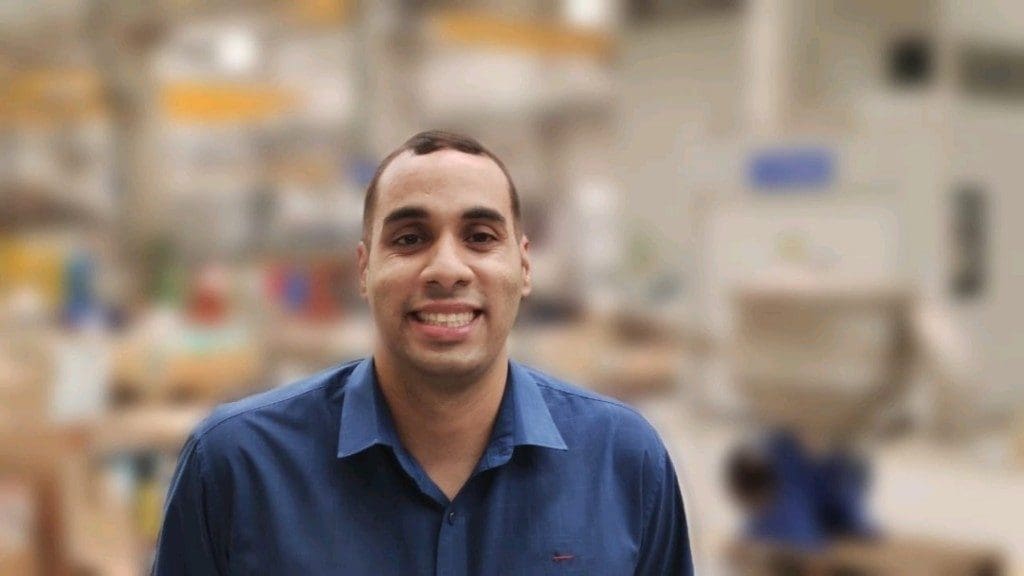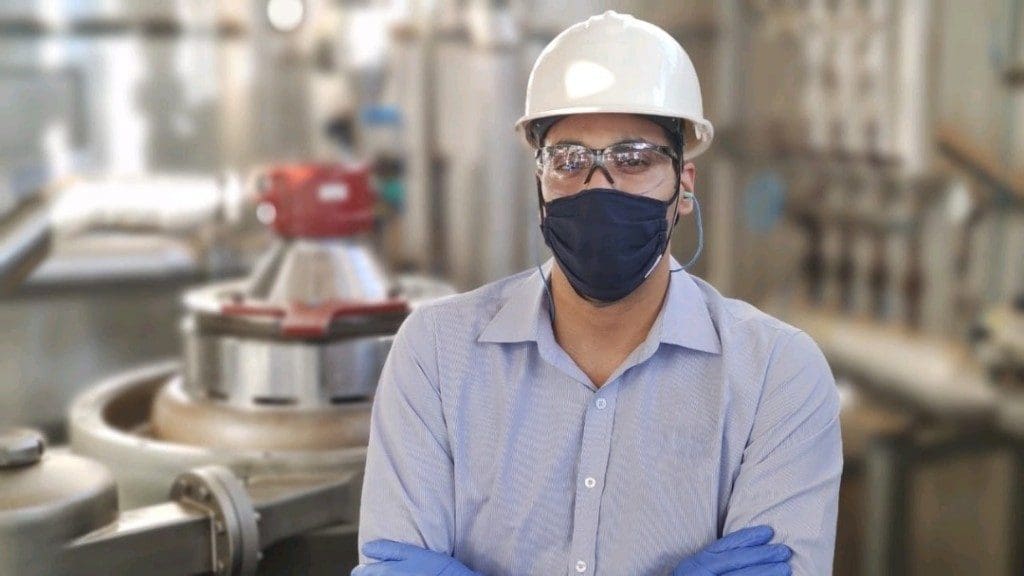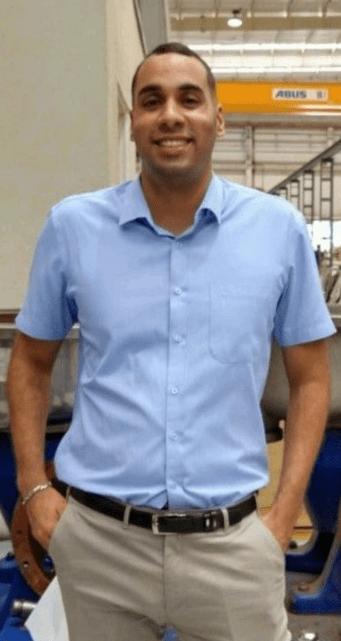Field Service Coordinator at Alfa Laval
Bruno Nogueira, Field Service Coordinator at Alfa Laval in Sao Paulo Brazil
Bruno Nogueira has an MBA in Strategic Service Management and Business Administration. Until December 2022 he planned and coordinated field services for different divisions of Alfa Laval including marine, oil and gas, chemicals, food, and beverage production. Bruno is based in Sao Paulo in Brazil.
In this article he discusses his experience as a field service coordinator managing and coordinating field service engineers including the challenges faced and lessons learnt during Covid19.


Background
What were your favourite subjects at school?
I always liked sport. As a child I was very hyperactive, and playing sport helped me to release the excess energy that I had. When I was a child my mother enrolled me in a swimming school, because I always liked the sea, and I was never afraid. I practiced this sport for many years and even took part in some competitions, but due to lack of time I was unable to pursue this career as a swimmer. So, I stopped competitive swimming. However nowadays I do some kind of physical activity every day like bodybuilding, running or cycling. These activities help me to get my head together.
What were you interested in when you were a child?
My favourite subjects were psychology and history. I like to communicate and studying the human mind, helps me with relationships with people. My favourite books are on subjects related to human behaviour and biographies of famous personalities.
Inspiration
Has there been a particular person who has inspired you?
In my life I have met several people who have inspired me at certain moments. As I like to hear what the people I know have to say, I always take a characteristic that I admire and use it to motivate myself.
Two people were important in forming my character, and these are my parents.
My father is very honest in every way, and he taught me since I was a little boy to be honest with myself and with other people. So, this is one of my values that is not open to negotiation under any circumstances.
My mother is very determined and encourages me to have the courage to fight for things and not to give up during challenges. I often say that:
“My rock bottom is a trampoline.”
Business Administration
Why did you decide to study business administration?
I decided to study business administration, as it is a multidisciplinary course that involves several areas of activity which interest me:
communication,
entrepreneurship,
marketing,
people management,
among others.
The course helped me to gain a broad knowledge in several subject areas.
Field service management
Can you explain what your work involves?
I have had a twelve-year career in the service management area where I worked with management, mapping and planning of projects and field services. Throughout I have worked in large national and multinational companies.
My first company was a graphics machinery and equipment company, where I started as an intern in the technical assistance department. After that, I moved to take the role of Field Services Coordinator, where I was responsible for planning, controlling and completing all field services.
Next was Alfa Laval, a Swedish multinational of industrial equipment, where I have been for the last eight years. My role in the Services Division is Project and Field Services Coordinator. In this role, I was responsible for managing and planning the field engineers’ tasks. My overall remit was to plan and monitor the work from start to finish to ensure that the services were performed according to the customer’s demand.
The field engineers cover a range of services:
start-up,
commissioning,
inspection and preventive maintenance.
I managed field engineers in several national and international segments such as Oil and Gas, Sugar and Alcohol, Vegetable Oil, Marine and Diesel and Sanitary.


Managing engineers
How many engineers did you manage and what areas are they covering?
In my first job I managed thirty-five field engineers, who were defined as mechanic, mechanic’s helper, electrical and offset instructor. In the second, there were seventeen field engineers made up of ten contractors and seven subcontractors; they were divided into mechanical engineers, automation engineers and training instructors.
Typical week
What is your typical week like?
In this area of field service, every week is different. Some are calmer and others are more pressurised. The vast majority are busy, as it is a very dynamic area with a different subject to work on all the time. Contact with different people is constant, as there are several projects that are carried out simultaneously. The follow-up has to be consistent and constant so that everything goes as scheduled and does not interfere with future work that is already being planned.
How much of your time is reactive? How do you make time to be proactive?
I try to build a friendly relationship with people based on trust. In this way, I am alerted by the field team if something is starting to go wrong, so that I can start to react.
However, we don’t always have control of the situation because it is quite dynamic. Sometimes an unforeseen emergency arises in which I have to be flexible and pass on confidence to everyone involved in the process.
Relationships with teams of engineers
How do you make a relationship with each individual engineer?
I am very observant and can identify the individual characteristics of each field engineer, and each one likes to be treated according to their values.
My relationship is built on trust. So, I try to be fair with all of them, even on occasions when I need to be stricter or give negative feedback. I believe that it is a way of having respect for people to be truthful and it’s not what you say but also how you say it.
For example, I had difficulties with an emergency, and I had to ask an engineer to attend on a special date. I tried to explain the context of the problem and the importance of solving it. After the engineer had completed the work, I made sure that I recognised what they had done and thanked them for their promptness and help. I have made several friends over the years who root for me and follow the victories in my career.
Field service within an organisation
Which other parts of the organisation do you deal with?
As field engineering is so key, I end up having contact with several areas. For example, the sales area in negotiating services, the financial area in relation to credit inquiries with customers and reimbursement of expenses, and human resources as support in people management.
Challenges of field engineering management and coordination
What do you find most challenging when you are working?
The biggest challenge is undoubtedly relationships with people, as it involves different personalities. I had daily contact with three key groups of people – salespeople, field engineers, and customers.
I need to work successfully with each group and the individuals in these groups.
Can you describe a time when your job was more than usually challenging? What happened?
The most challenging moment of my career was during the Covid19 pandemic, where I had to plan essential services while keeping safety first for field engineers. Plane trips were suspended, so field engineers carried out trips by car. In one case, there was a trip that lasted three days so that the engineer could reach their destination. In some cities there was no accommodation available and no restaurants working so you had to go to nearby cities. Monitoring was daily and I scheduled thousands of Covid tests, quarantine monitoring and contacts with nurses to accompany the technicians and provide medical certificates.
Several customers created quarantine and monitoring protocols to access the plant, thereby tripling the work of scheduling an engineer into the field.
These were difficult times as there was always the fear of someone becoming infected and infecting their family members on their return home. At that time, I took stock of my profession and thought wondered if it was worth it, because I didn’t feel comfortable asking someone to travel. If the worst had happened, I wouldn’t have been able to forgive myself, but thank God no one who worked in the field caught Covid. We redoubled our care and learnt a lot from that period. The collective effort was very important at that time, and I will never forget it.
Aftermath
How did you personally manage during Covid?
It was a very difficult period. However, it was then that I grew a lot, professionally and personally. The collective effort to keep the business safe was very important. We spent hours creating itineraries for car trips with the field engineers. They were long trips and often they suggested it themselves and felt proud to be contributing. After Covid, I started to have a different look at the people who work in the field and their importance. I have great respect for these professionals.
Managing workload
How do you keep things fair within a team of field engineers?
I try to distribute tasks as fairly as possible. For example, if an engineer spends fifteen days traveling, I try to plan his next job to be one where the engineer spends as little time as possible away from home and with family. At certain times, unfortunately, there is no way around these as emergency calls arise. When that happens, I contact the engineer and explain the whole context of the situation and where the other colleagues are and why they cannot attend.
New field engineers
What advice would you give to someone who has just started their first job as a field engineer?
The advice I would give to anyone starting out as a field engineer is to invest in communication. The power of clear speech is very important on several occasions, especially with the client. The client needs to have confidence in your work as they expect you to solve their problem.
Secondly, dedicate yourself to studying and researching your field of activity, as technology is advancing rapidly, and new equipment is accompanying this change.
Finally, be curious and point out solutions. Don’t be afraid to showcase your ideas and ask for contributions from your colleagues. I’ve seen cases where an engineer in the field had a problem and called on other teammates to help and this proactivity made all the difference to the success of the team. Teamwork and networking will open doors in the future.
How should they plan and stay organised?
I think it is key to stay organised in physical and mental things. Before any new activity, it is important to assess whether the area is safe, whether all the resources necessary for the service are available and whether the scope offered corresponds to the customer’s expectations.
The mind of a field engineer needs to be well structured, as they spend a lot of time away from home, family, and friends.


Field Service Coordinator
What sort of person makes an ideal Field Service Coordinator?
The coordinator of projects and field services must be a dynamic professional and must be able to adapt to the environment and situations in which they find themselves.
Further reading
Arturo González Ballast Water Treatment Service Engineer at Alfa Laval
Simon Fernandez de la Mata, Marine Field Service Manager in Spain


Responses